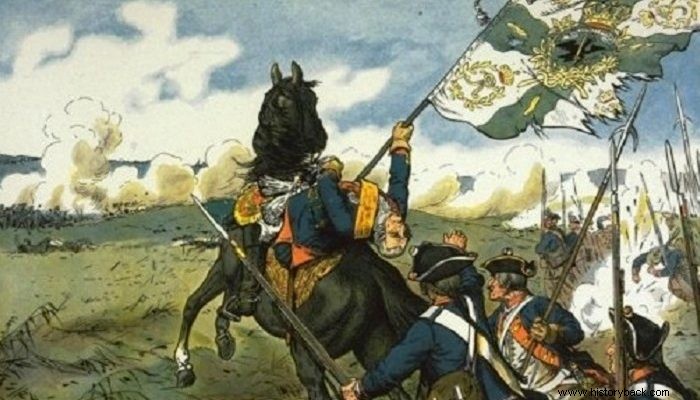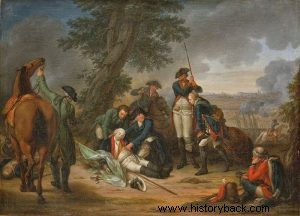
Born in Löwicz, Pomerania, in 1684, Kurt Christopher Count von Schwerin came from the ducal house of Mecklenburg-Schwerin. At a young age he turned to the military and during the War of the Spanish Succession (1700-1715), he enlisted in the Dutch army.
He fought in the Allies' victorious battles of Schellenberg and Blenheim , against the French and Bavarians, under the command of the great English general John Churchill, Duke of Marlborough. In 1707 he joined the army of Mecklenburg-Schwerin and fought in the great battle of Ramigi and the deadly battle of Malplaquet with the rank of lieutenant colonel. He also fought for the Swedes against the Russians. In 1718 he was promoted to lieutenant general.
The following year he met the invasion of Hanoverian forces in Mecklenburg, achieving a brilliant victory at Wassmillen . In 1720 he joined the Prussian service where he remained for the next 37 years, until his death.
In 1722 he took command of an infantry regiment. In 1730 he was a member of the military court that tried the then prince Frederick (later the Great), by order of the strict father of King Frederick William I.
In 1733 head of Prussian force diplomatically resolved the Mecklenburg crisis. In 1734 he was promoted to lieutenant general and in 1739 to general. He played an important role in strengthening the Prussian army which became the most perfect military machine in the world at the time, but he also became a military mentor to the future Prussian king.
In 1740 the now king Frederick the Great named him marshal. Swerin performed exceptionally well at the Battle of Mollwitz (1741) defeating the Austrians with only infantry while Frederick, disappointed, had left the battlefield believing that his army had been decisively defeated.
After the Prussian victory in the First Silesian War (1740-41) he took over the administration of a part of the new Prussian province (Silesia). His contribution was also important in the operations of the Second Silesian War (1744-45). After that he retired to his estates until 1756 when the Seven Years War broke out. Then he returned to service and fought on the side of Frederick in the battle of Prague.
When the Prussian attack was repulsed he put himself, on horseback, at the head of the 24th Infantry Regiment, of which he was an honorary colonel and with the flag in his hand he shouted:"Let all the brave Prussians follow me...".
The brave marshal, despite his 73 years, moved forward. But at that moment he was hit by the Austrian guns and fell dead. It was the death a born soldier deserved.

The death of Marshal von Schwerin.
